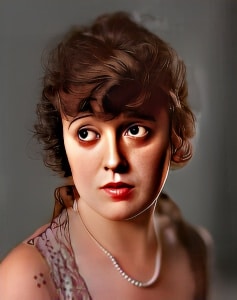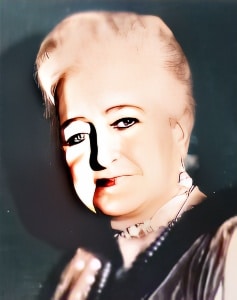 Mabel Normand, born on November 10, 1892, in New Brighton, New York, was a pioneering American silent film actress, screenwriter, and director.
Mabel Normand, born on November 10, 1892, in New Brighton, New York, was a pioneering American silent film actress, screenwriter, and director.
She was one of the most popular and versatile comedians of the silent era and played a significant role in shaping the early Hollywood film industry.
Mabel Normand’s career began in the early years of the 20th century when she started working as an artist’s model before transitioning to acting in silent films. She began her film career at the Biograph Company, one of the early motion picture studios in the United States. Her first film appearance was in the 1910 short film “Her First Biscuits,” directed by D.W. Griffith.
Normand quickly rose to prominence and gained recognition for her natural comedic talent and screen presence. She was known for her work at Keystone Studios, where she collaborated with other comedy legends like Charlie Chaplin and Roscoe “Fatty” Arbuckle. Her work at Keystone solidified her status as one of the leading comedians of the silent era.
One of Mabel Normand’s most significant contributions to film history was her role in helping create the slapstick comedy genre. Her collaborations with Chaplin and Arbuckle in films like “Mabel’s Strange Predicament” (1914) and “Fatty and Mabel Adrift” (1916) were instrumental in developing the comedic style that would become a hallmark of silent film comedy.
In addition to her acting career, Mabel Normand also took on roles as a director and screenwriter. She directed several films, including “Mickey” (1918), which she also wrote, and “Suzanna” (1923). Her work behind the camera was notable as she was one of the few female directors during that era.
Normand’s personal life was often in the spotlight, and her off-screen relationships garnered attention from the media. She had a close working and personal relationship with fellow comedian Roscoe Arbuckle, and they appeared in numerous films together. However, Arbuckle’s career was marred by scandal in the early 1920s, and Normand faced her share of troubles as well.
Despite the challenges and controversies, Mabel Normand’s career continued to thrive. Her talent and contributions to the film industry were widely recognized, and she was known as the “Queen of Comedy” during her time.
Tragically, Mabel Normand’s life was cut short. In 1930, at the age of 37, she passed away due to complications from tuberculosis. Her death marked the loss of one of the silent era’s most beloved and influential figures.
Mabel Normand’s legacy lives on through her films and her pioneering contributions to comedy in early cinema. She played a crucial role in the development of film comedy, and her work continues to be celebrated and studied by film historians and enthusiasts. Normand’s influence on the comedy genre in cinema remains significant, and her career exemplifies the pioneering spirit and talent of early Hollywood.




